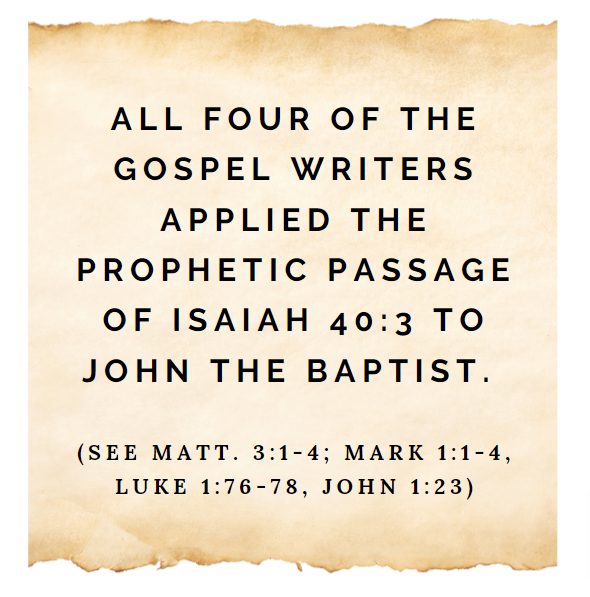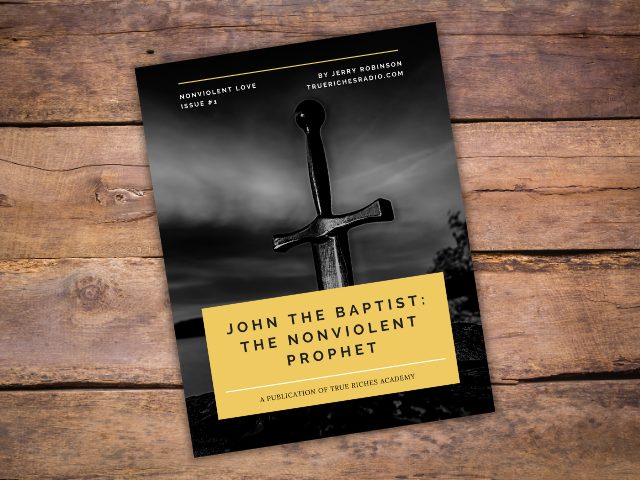Download the 19-page report here
Prior to the beginning of the earthly ministry of Jesus Christ, a forerunner appeared to herald His first coming.
That forerunner was a man named John.
“The word of God came unto John the son of Zacharias in the wilderness. And he came into all the country about Jordan, preaching the baptism of repentance for the remission of sins.” (Luke 3:2,3)
John was the last of the Old Testament prophets and, according to Christ, was chief among them.
“For I say unto you, Among those that are born of women there is not a greater prophet than John the Baptist: but he that is least in the kingdom of God is greater than he.” (Luke 7:28)
According to Jesus, John was a greater prophet than Moses. John’s incredibly brief, but life-changing, ministry took place in the Judean wilderness outside of the comforting deceptions of the city.
John, the son of Zacharias, was the long-prophesied “voice of one crying in the wilderness,” divinely sent as the human herald of the ministry of Jesus Christ.
“The voice of him that crieth in the wilderness, Prepare ye the way of the LORD, make straight in the desert a highway for our God.” (Isaiah 40:3)
All four of the Gospel writers applied the prophetic passage of Isaiah 40:3 to John. (See Matt. 3:1-4; Mark 1:1-4, Luke 1:76-78, John 1:23)

“Comfort ye, comfort ye my people, saith your God. Speak ye comfortably to Jerusalem, and cry unto her, that her warfare is accomplished, that her iniquity is pardoned: for she hath received of the LORD’S hand double for all her sins.” (Isaiah 40:1,2)
Through the prophet Isaiah, God is speaking words of great comfort to His people, Israel. But take note of what this prophetic passage reveals about the ministry of John the Baptist.
As the loving Father that Christ reveals Him to be, God is sending news of peace to His battle-weary children: Your life of warfare is complete! The time for war is over!
The days of Samson fending off Philistine enemies are over.
The days of Israel’s violent conquests under Joshua and other military commanders have now come to an end.
The ancient book of Isaiah reveals that God will raise up the voice of John the Baptist to herald this incredible message of peace.
This voice in the wilderness will call God’s people to prepare themselves for the arrival of God on earth and “all flesh shall see it together.” (Isaiah 40:5)
In essence, God’s true nature and character, which is rooted in love, peace, grace, mercy, and forgiveness, dawn in the opening words of the New Testament.
The beginning of the long-awaited ministry of John doesn’t mark the beginning of a “new” age of grace.
It is, instead, the revelation of God’s eternal grace towards all men, “which in other ages was not made known to the sons of men, as it has now been revealed by the Spirit to His holy apostles and prophets.” (Ephesians 3:4-6)
The first coming of Jesus did not mark the beginning of God’s grace toward mankind. Rather, Jesus came to reveal the grace that our Father has always had for mankind. Jesus explained the mystery of God’s grace by uttering things “hidden since the foundation of the world.” (Matthew 13:35)
Therefore, we properly apprehend John’s prophetic ministry when we understand that he was called to reveal the One (Jesus) who would reveal the truth of all things.
The voice crying out in the wilderness calls all who will listen to repent. (Matthew 3:2)
The Greek word for our English word “repent” is metanoéō and literally means “to change one’s mind or purpose.”
Through the light of Christ, we learn that it was man, not God, that required repentance.
God had not changed his mind (“repent”) about man nor did He need to change His mind regarding His purpose toward man.
The good news of peace is that God’s purpose and grace towards mankind never changed, nor was it ever amended.
Instead, John is calling those with ears to hear to change their minds (“repent”) so as to think differently about God and His grace.
To that end, a major part of John’s message, according to Isaiah 40:2, was to call men to lay down their swords of battle in preparation because the days of warfare had been “accomplished.”
Those precious few who heeded John’s call to “bring forth fruits worthy of repentance” were then further commanded to publicly declare their commitment to righteousness by the outward act of water baptism. (Luke 3:3,8)
Before Jesus launched out into his earthly ministry, He was baptized by none other than John. (John 1:29-34)
What an incredible honor for John, which partially explains his “greatness” in Christ’s eyes!
Given the importance of John’s ministry, it is instructive for our current study to examine an interesting New Testament passage describing an encounter he had with a group of sword-bearing soldiers.
After delivering one of his many calls for repentance in the wilderness, his listeners were moved to penitence and came to ask John how they should now live.
“And the people asked him, saying, What shall we do then? He answereth and saith unto them, He that hath two coats, let him impart to him that hath none; and he that hath meat, let him do likewise… And the soldiers likewise demanded of him, saying, And what shall we do? And he said unto them, Do violence to no man, neither accuse [any] falsely; and be content with your wages.” (Luke 3:10-11,14-15 KJV)
If John’s prophetic words sound familiar, it is because they strongly resemble the commands to be given later by Jesus to those seeking righteousness through His life-changing Sermon on the Mount. (See Matt. 5-7)
Of course, the “voice of the one crying in the wilderness” dares not contradict the ultimate message of the One whom he heralds.
In response to the soldiers’ inquiry as to how they should now live, in light of God’s revelation of their wickedness, John gives the soldiers three specific commands.
The first of these three commands may come as a shock to many modern-day readers, but it cannot be denied, for the Lord ensured that it remains forever etched into Luke’s gospel account.
Namely, it is that the soldiers should “do violence to no man.”
Admittedly, this command sounds rather impractical, let alone possible, for those who had chosen a profession that often required acts of violence. If so, this command fits in nicely with many similar commands that men find unreasonable and illogical, like Christ’s own commands to love your enemy, lend without repayment, and to return good for evil.
Likely for this very reason, some Bible translators have sought to obscure the overt nonviolent nature of this command to make it say something different than its outrageously clear meaning over the centuries. This can be seen in a variety of modern Bible translations that totally change the meaning of the verse.
Instead of stressing the command to “do violence to no man,” as it is clearly presented in the King James Version, many different popular Bible translations seek to alter this command by strictly limiting it to extortion-motivated violence.
Here are a few examples of Bible translations that have taken this approach.
First, here’s the NIV translation:
“Then some soldiers asked him, “And what should we do?” He replied, “Don’t extort money and don’t accuse people falsely—be content with your pay.” (NIV)
Here’s how it reads in the New Living Translation:
“What should we do?” asked some soldiers. John replied, “Don’t extort money or make false accusations. And be content with your pay.” (NLT)
Then there is the English Standard Version:
“Soldiers also asked him, “And we, what shall we do?” And he said to them, “Do not extort money from anyone by threats or by false accusation, and be content with your wages.” (ESV)
And finally, there is the New American Standard translation:
“Some soldiers were questioning him, saying, “And what about us, what shall we do?” And he said to them, “Do not take money from anyone by force, or accuse anyone falsely, and be content with your wages.” (NASB)
There is one glaring problem with each of these above translations. That is, John’s command to “do violence to no man” which has been changed by some translators to “do not extort money” is largely without merit.
If John’s goal was to specifically command the soldiers not to extort money, he could have easily done so with a derivative of a more direct Greek word, like “harpagé” or “harpax”, both of which appear several times throughout the New Testament in reference to the act of extortion.
Instead, the Greek word used in this passage is “diaseió.” According to the Strong’s Concordance, this Greek compound word only appears once in the entire New Testament and literally means “to shake violently.” (It combines two Greek words, diá “thoroughly” and seío “shake.”)
It is only by ignoring the plain reading of the text that one would suggest that this passage, which explicitly prohibits violence being used against anyone (“médeis,” accurately meaning “no one, nothing” – literally, “not even one“), is narrowly confined to an act of violence solely employed for extortion.
But it is also a convenient way to avoid an uncomfortable discussion about a Christian’s participation in the military.
After all, if the soldiers followed John’s command to refrain from using violence against anyone (i.e. all men), we would expect the progress of human warfare to be stifled.
This, of course, would be perfectly in line with Isaiah’s prophecy about the end of warfare (Isaiah 40:2) and with Christ’s own commands to demonstrate nonviolent love towards both friends and enemies. (See Matthew 5:44; Luke 6:27)
So, it is clear that John is commanding these soldiers, who come with a heart of repentance, to put away their swords in response to God’s grace.
Putting It All Together
Let’s summarize this important account with the following points.
John issues three specific ethical commands to the soldiers who are seeking repentance.
These include:
a) to do no violence to any man
b) to not bear false witness, and
c) to be content with their wages.
All three of these ethical commands collided head-on with the constant temptations facing all soldiers in ancient Roman military culture. But these three commands also aligned perfectly with Christ’s own command to put away the sword and to pick up the cross. (Matthew 16:24, 26:52)
Christ didn’t call his disciples to pick up their cross while carrying a sword. No sword. Just their cross.
Just like Jesus.
Some Bible translations have faithfully preserved John’s clear meaning to “do violence to no man” based on the Greek word meaning of “to shake violently.”
(See the KJV, Aramaic Bible in Plain English, Douay-Rheims, English Revised Version, Literal Standard Version and Young’s Literal Translation.)
However, others have softened and narrowed the command by rendering it as “to not extort money.”
This translation is incorrect for at least three simple reasons:
a) A reading of the original Greek never mentions anything about money in the first command, only violence.
b) It contradicts Christ’s own commands for His followers to practice nonviolent love towards their enemies.
c) The early Church fathers understood John’s admonition to the soldiers as a rejection of violence and the way of war. So too, historians are clear that soldiers were made to understand their need for repentance, especially during the first three centuries of church history.
When all else fails, some might suggest that since John told the soldiers to be “content” with their wages, he certainly did not expect the soldiers to leave their positions and therefore did not view their occupations as incompatible with true repentance.
There are at least two immediate responses to this claim.
a) John’s ministry occurred under the Mosaic economy, just before the unveiling of the New Covenant. Given this fact, it is astounding that John envisioned any such limitations on military violence. Unsurprisingly, this fact is rarely noted by those who seek to use this verse to argue for Christians serving in the military.
Put simply, John’s ethical commands are given prior to the commencement of the New Covenant.
So, it is clear that John is commanding these soldiers, who come with a heart of repentance, to put away their swords in response to God’s grace. It would seem to argue against this plain understanding would only serve the flesh, not the Spirit.
Besides, should we expect John to contradict the Spirit and message of the One of Whom he prophesied?
b) While John did not expressly urge the soldiers to abandon their occupation, he did command them to “do violence to no man” rendering them ineffective in their military role and thereby slowing the progress of war in the region.
While we are not told how the soldiers received or reacted to John’s commands, they were likely stunned by his words and challenged to reconsider the ambitions they may have previously shared with their sword-wielding peers.
Conclusion
It should not come as a surprise that John would tell the soldiers to avoid violence, as this is the exact message that Christ delivered to His own followers.
Jesus did no violence and told everyone to “follow” Him.
In pointing to the coming savior of Israel, the prophet Isaiah prophesied of a suffering servant as the one who “had done no violence.”
“And he made his grave with the wicked, and with the rich in his death; because he had done no violence, neither was any deceit in his mouth..” (Isaiah 53:9 KJV)
John was not unfaithful to his calling and no Christian should expect him to contradict His own Master in his message.
No servant is greater than his Master.
Clearly, John the Baptist’s nonviolent message holds significant importance for Christians seeking God’s wisdom on violence today.
Let us all heed John’s command to “do violence to no man” so that we may come to look more like our nonviolent Master, Jesus Christ.
Related Resources
From Sword to Savior: It’s Time To Rethink The Roman Centurion
Just War Theory vs Jesus Christ
Are Gun Rights “God-Given?” – The “Christian” Roots of America’s Gun Culture







